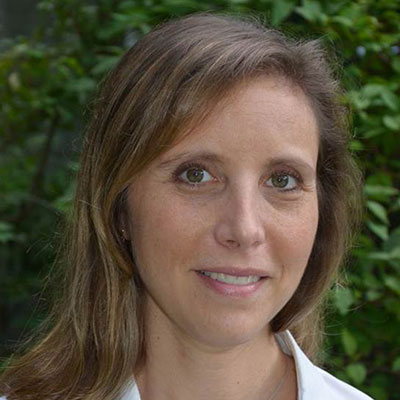
Dr. Marisa Battistella graduated from the Faculty of Pharmacy at the University of Toronto in 1998 and completed her pharmacy residency at Sunnybrook and Women’s Health Sciences Centre in 1999. She has worked at the University Health Network since 1999 in various positions, including cardiology and internal medicine. In 2002, Dr. Battistella completed her Pharm D thru Idaho State University. She has worked as a clinical pharmacist specialist in the hemodialysis unit at the University Health Network since 2002. Dr. Battistella has published several papers and given many presentations on drug therapy in the area of nephrology. She also maintains an active teaching involvement, with the University of Toronto, Leslie Dan Faculty of Pharmacy.
As a Clinician Scientist in Pharmacy at the University Health Network and the Leslie Dan Faculty of Pharmacy, Dr. Battistella maintains an active teaching role and focuses much of her time on clinical research in the area of nephrology. She was also the Chair and education coordinator to the Renal Pharmacists Network (RPN), a national organization for renal pharmacists and currently is the external liaison co-ordinator for the RPN.
Heather Beanlands is an associate professor in the Daphne Cockwell School of Nursing at Ryerson University. Beanlands’ program of research focuses on psychosocial response, health behaviors and quality of life in chronic illness; with a particular interest in chronic kidney disease. She is also interested in developing novel interventions to support self-management and treatment decision making, as well as promoting psychosocial well-being for people living with a variety of chronic conditions. Beanlands’ current work includes collaborations with a multidisciplinary, multi-site team currently designing and testing a decision support tool for people living with a specific form of kidney disease.
Along with Elizabeth McCay, Beanlands serves as the co-director of the Centre for Health in At-Risk Populations, which focuses on designing and conducting studies focused on promoting emotional well-being, positive self-concepts and improved quality of life for people living with a range of physical and mental health conditions.
Other current research collaborations are focused on developing and testing novel psychosocial interventions for individuals living with a variety of chronic conditions.


Dr. Carol Bullin has an extensive and diverse clinical nursing background that includes critical care, perioperative, acute surgery and medicine, mental health, and community health. Her current clinical practice area is chronic disease management, specifically, chronic renal disease. Dr. Bullin has taught in all four years of the NEPS Regular Option and in both years of the Second Degree Option. She assumed a tenure-track position with the University of Saskatchewan College of Nursing effective July 1, 2011.

Dr. Burns received his B.Sc. (Honours Physiology) in 1980 and his M.D., C.M. from McGill University in 1984. He completed his residency training in Internal Medicine in 1988 and Nephrology in 1990 at the University of Ottawa. From 1989 to 1992, he performed a Research Fellowship in the Division of Nephrology at Vanderbilt University, under the supervision of Dr. Ray Harris.
Dr. Burns is a Full Professor of Medicine in the Division of Nephrology at The Ottawa Hospital and the University of Ottawa. He is Director of the Kidney Research Centre of the Ottawa Hospital Research Institute, University of Ottawa, and is cross-appointed to the Department of Cellular and Molecular Medicine. His research program is supported by funds from the Canadian Institutes of Health Research, the Kidney Foundation of Canada, and the Canada Foundation for Innovation/Ontario Innovation Trust. In 1992, he was awarded a five year Scholarship from the Medical Research Council of Canada (1992-1997). Dr. Burns was President of the Canadian Society of Nephrology from 2004 to 2006.
Dr. Burns is the Program Director of the KRESCENT Program (Kidney Research Scientist Core Education and National Training Program). Its founding partners, the Canadian Society of Nephrology and the Kidney Foundation of Canada, launched this innovative program in 2005 with support from the CIHR and the private sector. KRESCENT will train up to 28 new kidney research scientists in Canada over the next six years, from all disciplines of research, and the program will provide salary support, a core curriculum that emphasizes knowledge translation, and ongoing mentorship.


Dr. Amit Garg has held an appointment with the Institute for Clinical Evaluative Sciences since 2006. He is a nephrologist at the London Health Sciences Centre, where he provides care and conducts research to improve health outcomes for patients with kidney disease including those receiving dialysis or a kidney transplant. He enjoys working with colleagues and trainees in a multi-disciplinary team based environment to generate and translate new knowledge for better health. Dr. Garg currently serves as Ontario provincial lead for the ICES Kidney, Dialysis and Transplantation (KDT) Program and director for ICES Western.

Richard Gilbert is Professor of Medicine at the University of Toronto, Canada Research Chair in Diabetes Complications and Head of the Division of Endocrinology at St. Michael’s Hospital in Toronto. His major interests are in the treatment and prevention of diabetic complications with an emphasis on nephropathy and heart failure. Dr. Gilbert has published over 220 peer-reviewed manuscripts, has numerous patents and co-founded Fibrotech, a biotechnology company that has brought novel anti-fibrotic therapies from the bench to early phase human trials. He is currently a member of the editorial board of Diabetes. Current research projects relate to the use of new therapies for the prevention and treatment of chronic kidney disease and heart failure. In addition to his bench research, Dr. Gilbert is actively involved in teaching and knowledge translation. He currently heads Guidelines Committees for the management of hypertension in diabetes.

Dr. Brenda Hemmelgarn is a Professor in the Departments of Medicine and Community Health Sciences, and is Head of the Department of Community Health Sciences, Cumming School of Medicine at the University of Calgary. She is a member of the Libin Cardiovascular Institute of Alberta and the O’Brien Institute for Public Health (OIPH), and holds the Roy and Vi Baay Chair in Kidney Research. Dr. Hemmelgarn is also the vice-chair of the Alberta Health Services Board.
Dr. Brenda Hemmelgarn is a specialist in Nephrology, with research expertise in health services research. She completed a PhD in Epidemiology and Biostatistics at McGill University, earned her medical degree from McMaster University, and pursued subspecialty training in internal medicine and nephrology at the University of Calgary. Her research interests focus on strategies to improve the care of people with chronic kidney disease and other chronic health conditions. As co-lead of the Interdisciplinary Chronic Disease Collaboration (ICDC), a province-wide research team, Dr. Hemmelgarn’s work has contributed significantly to improving the health of patients living with chronic disease. She is the director of the Alberta Kidney Disease Network and is involved in clinical practice guideline development at national and international levels. She is also active in the teaching and supervision of undergraduate and graduate trainees.
In 2012 her work in conjunction with the ICDC was recognized with the Alberta Health Services President’s Excellence Award for Outstanding Achievements in Research and a Top Canadian Achievements in Health Research Award from the CIHR-CMAJ in 2013. Dr. Hemmelgarn was inducted as a fellow of the Canadian Academy of Health Sciences in 2012 and was recognized last year with a Killam Research Leader Award.

Dr. Matthew James is a specialist in Nephrology and an Assistant Professor and Clinician Scientist in the Departments of Medicine and Community Health Sciences. Dr. James received his medical training at the University of British Columbia, and completed his clinical training and a PhD in Epidemiology at the University of Calgary. He holds a KRESCENT New Investigator Award and University of Calgary Petro Canada Young Innovator Award in Community Health. His interests include health services research focusing on acute kidney injury, progression of chronic kidney disease, and cardiovascular disease. His research is supported by the Canadian Institutes of Health Research, Alberta Innovates Health Solutions, the MSI Foundation, and Kidney Foundation of Canada.

Dr. Johnson is a pharmacist and health services researcher. He is a Centennial Professor in the School of Public Health at the University of Alberta, and a Senior Health Scholar with Alberta Innovates Health Solutions. Dr. Johnson leads the “Alliance for Canadian Health Outcomes Research in Diabetes”.
Dr. Johnson has a long history of working with national and provincial agencies, both government and non-government, in areas of diabetes and public health policy and research. He has worked closely with Alberta Health, leading the Alberta Diabetes Surveillance System (ADSS) from 2005 to 2009, and the Alberta’s Caring for Diabetes Project from 2008-2015. From 2012 to 2014 Dr. Johnson served as the inaugural Scientific Director for Diabetes, Obesity and Nutrition, Strategic Clinical Network, Alberta Health Services.
Dr. Johnson also leads a productive line of research and application of health-related quality of life measurement, including various applications in controlled trials, population health, and health care system evaluation. Dr. Johnson has been an active member of the EuroQol Group since 1996 and serves on the Board of Directors of the EuroQol Research Foundation.

Dr. Joanne Kappel completed undergraduate and postgraduate medical training in Saskatoon. Her nephrology fellowship was undertaken at the University of Toronto. She returned to Saskatoon in July 1989 to begin private practice nephrology associated with the College of Medicine University of Saskatchewan. She is currently Clinical Professor of Medicine, Head Division of nephrology for the College of Medicine and Dyad Co-Lead for Kidney Health Services, Saskatoon Health Region. She is also the Medical Director for the Chronic Kidney Disease Program, Saskatoon Health Region.


Farid Mahmud received his medical degree at The University of Alberta, Edmonton. He trained in Paediatric Endocrinology and Metabolism at The Mayo Clinic, Rochester, Minnesota, USA. He is currently Staff Physician in the Division of Endocrinology, Department of Paediatrics, Associate Professor at the University of Toronto and Associate Scientist at The Hospital for Sick Children Research Institute.
Dr. Mahmud’s overall research focus is diabetes, clinical and translational research relating to co-morbid auto immune conditions, and early evaluation and prevention of related complications. His research interests include:
- Interventions in High Risk Pediatric groups including Type 1 and Type 2 Diabetes to alter CVD risk. As part of an international, double-blind, randomized control trial, Dr. Mahmud serves as Principal Investigator of the Adolescent Diabetes Cardio-Renal Intervention Trial (AdDIT) Expansion in Canada.
- Assessment of co-morbid autoimmune conditions: impact of Celiac Disease and Type 1 Diabetes. Dr. Mahmud has a longstanding interest in Celiac Disease as an association with Type 1 Diabetes. He serves as Principal Investigator of a dietary intervention study (Celiac Disease and Diabetes – Dietary Intervention and Evaluation Trial (CD-DIET).
- Evaluation of social determinants of health on paediatric chronic disease.

Dr. Chris McIntyre is Professor of Medicine, Professor of Medical Biophysic, Professor of Paediatrics and Robert Lindsay Chair of Dialysis Research and Innovation at Western. He also serves as Director of the Lilibeth Caberto Kidney Clinical Research Unit at London Health Sciences Centre, where he is also a practicing Clinical Nephrologist. He leads a team of multidisciplinary researchers focused largely on the pathophysiology of the effecting cardiovascular, brain, liver and gastro-intestinal structure and function in patients with chronic kidney disease. These studies include basic clinical science, natural history studies and the development and application of novel therapeutic strategies into large scale randomized controlled trials. These studies have increasingly focused on the adverse consequences resulting from dialysis therapy itself and the improvement in outcomes by the reduction of preventable harm. Multimodal imaging plays an important role in these studies including ultrasound, CT, PET and MRI.

Dr. Pei is a Professor of Medicine at the University of Toronto and a Staff Nephrologist at the Toronto General Hospital, University Health Network, where he currently directs the Hereditary Kidney Disease Clinic. He obtained his research training in Clinical Epidemiology at McMaster University and later on, in Human Molecular Genetics in Toronto.He has published more than 90 peer-reviewed papers and has served in the Editorial Board for the Journal of American Society of Nephrology and Grant Review Panels for the Kidney Foundation of Canada, Canadian Institutes of Health Research, and National Institutes of Health, USA. He is currently a member of the Scientific Advisory Committee for the Kidney Foundation of Canada and Polycystic Kidney Disease Foundation, USA.

Dr. Reich is a graduate of McGill University Faculty of Medicine. She completed her post-graduate clinical training and PhD at University of Toronto where she is an Associate Professor and holds the Gabor Zellerman Chair in Nephrology Research. She works as a nephrologist-scientist at the University Health Network and is passionate about improving the clinical care and outcomes of patients with glomerulonephritis.
Dr. Reich’s research objective is to identify clinical and molecular markers of progressive glomerular diseases, and she is scientific director of the Toronto GN Registry. Her translational research program focuses on the study of human biologic samples to elucidate the mechanisms responsible for progression of kidney disease towards kidney failure. This molecular work is complemented by studies to identify clinical risk factors for disease progression in glomerulonephritis. She enjoys teaching and is the co-director of the annual educational pre-course in glomerulonephritis for the American Society of Nephrology.

Dr. James Scholey is a Professor of Medicine and Physiology and a Physician Scientist in the Department of Medicine at the University of Toronto. He is also a Senior Scientist in the Toronto General Research Institute and a staff physician in the Division of Nephrology in the Department of Medicine at the University Health network and Mount Sinai Hospital.
Dr. Scholey’s research focuses on mechanism(s) responsible for the progression of chronic kidney disease with a special interest in diabetic nephropathy and the renin angiotensin system. His laboratory employs cell-based and murine models of kidney injury. He also has a longstanding interest in the physiology of human diabetic kidney hyperfiltration and the impact of proteinuria on the progression of glomerulonephritis.
Dr. Scholey’s research program in Can-SOLVE CKD is focused on the identification of kidney risk in youth with diabetes mellitus. These studies are a collaborative effort with researchers at the Hospital for Sick Children in Toronto and researchers at the Children’s Hospital Research Institute in Winnipeg.

Dr. Etienne Sochett received his medical degree at the University of Pretoria in South Africa. He currently serves as a Staff Endocrinologist and is the Co-Director of the Bone Health Centre at the Hospital for Sick Children.
Dr. Sochett is involved in care with patients with endocrine disorders, diabetes as well as calcium and bone disorders.
Dr. Sochett conducts research in a variety of areas with a special interest in the early pathophysiology of diabetic nephropathy in adolescents with type 1 diabetes, the genetic contribution to juvenile idiopathic osteoporosis, idiopathic infantile hypocalcaemia and glucocorticoid induced osteoporosis.

Dr. Straus is a Professor in the Department of Medicine at the University of Toronto. She holds a Tier 1 Canada Research Chair in Knowledge Translation (KT) and Quality of Care and more than $30 million in peer reviewed research grants as a Principal Investigator (PI). She has >300 publications, and has supervised >25 graduate students from different disciplines including clinical epidemiology, health informatics and human factors engineering. She is co-Principal Investigator of KT Canada, a Canadian Institutes of Health Research (CIHR) and Canadian Foundation for Information funded national, Clinical Research Initiative, PI of KT Canada’s CIHR-funded Strategic Training Initiative in Health Research and PI of a network meta-analysis team grant for the Drug Safety and Effectiveness Network. She is Division Director of Geriatric Medicine at the University of Toronto and Director of the KT Program at the Li Ka Shing Knowledge Institute of St. Michael’s Hospital. She has authored three books. Evidence-based medicine: How to practice and teach it is in its fourth edition, and has been published in 9 languages; Knowledge Translation in Health Care, is now in its second edition; and the first edition of Mentorship in Academic Medicine.

Dr. Navdeep Tangri is an attending physician and Associate Professor in the Division of Nephrology, Department of Medicine and the Department of Community Health Sciences at the University of Manitoba. Dr. Tangri’s research program is clinical and translational and focused on improving clinical decision making for patients with advanced chronic kidney disease. He developed and validated the Kidney Failure Risk Equation to predict the need for dialysis in patients with CKD, and is presently engaged in multiple validation and implementation exercises to increase the uptake of the KFRE.

Dr. Tonelli is a graduate of the University of Western Ontario’s Faculty of Medicine (1995), and completed his postdoctoral training at the University of Western Ontario (1998), Dalhousie University (2002) and the Harvard School of Public Health (2002). He spent 12 years with the University of Alberta’s Department of Medicine, and joined the University of Calgary Cumming School of Medicine in 2014, taking on the role of Senior Associate Dean (Health Research).
Dr. Tonelli’s research focus is improving the care of people with chronic kidney disease and other noncommunicable diseases. He has partnered with regional, provincial and national decision-making bodies to inform clinical practice and impact health policy in this area. He completed a volunteership at the World Health Organization in 2013-2014, focusing on treatment of noncommunicable diseases following natural disasters and civil conflict. During this time he also completed an MSc in Health Policy from Imperial College London.
Dr. Tonelli is a co-lead for the Alberta-based Interdisciplinary Chronic Disease Collaboration. He is chair emeritus of the Canadian Task Force on Preventive Health Care and a past President of the Canadian Society of Nephrology. He leads the International Society of Nephrology’s global research portfolio and is a member of the Governing Council of the Canadian Institutes of Health Research. He established and is the inaugural Director of the Pan American Health Organization/World Health Organization Collaborating Centre for the Prevention and Control of Chronic Kidney Disease.
Dr. Tonelli was the recipient of the 2013 United States National Kidney Foundation Medal for Distinguished Service and the Kidney Foundation of Canada’s 2013 Medal for Research Excellence for changing nephrology practice in Canada and beyond. Along with the two other team co-leads, he received a Top Canadian Achievements in Health Research Award from the CIHR-CMAJ in 2013 for his work with the Interdisciplinary Chronic Disease Collaboration. He was elected a fellow of the Canadian Academy of Health Sciences in 2012 and a member of the American Society for Clinical Investigation in 2014. He was named a “Highly Cited” researcher in 2015, 2016 and 2017 by Thomson-Reuters, corresponding to a rank in the top 1% by citations of all researchers worldwide for field and publication year.

Dr. Michael Walsh received his MD, internal medicine and nephrology training at the University of Calgary. He then completed a MSc in Clinical Epidemiology and a research fellowship in lupus and vasculitis at the University of Cambridge followed by a second fellowship and a PhD in Health Research Methodology at McMaster University. He is now an Assistant Professor of Medicine (Nephrology) and Clinical Epidemiology and Biostatistics. His research interests are in systemic autoimmune diseases, particularly ANCA associated vasculitis, chronic kidney disease, and end-stage renal disease with a focus on prospective studies and clinical trials to evaluate risk markers, understand pathophysiology, and develop effective treatment strategies. He is member of several research groups including the European Vasculitis Research Group (EUVAS), the Vasculitis Clinics Research Consortium (VCRC), the Clinical Advances through Research and Information Translation (CLARITY), and the Population Health Research Institute (PHRI). Dr. Walsh is the recipient of numerous research grants and awards and supervises graduate students through the Health Research Methods program.

Dr. Brandy Wicklow is a Pediatric Endocrinologist at HSC Children’s and Assistant Professor, Department of Pediatrics and Child Health, College of Medicine, University of Manitoba
Dr. Wicklow received her MD from the University of Manitoba in 2003 and her Pediatrics certification in 2006. She attended McGill University in Montreal for a 2 year clinical endocrinology fellowship (2008) and returned to Manitoba to complete 2 years of post doctoral clinical research training focused on the determinants of type 2 diabetes in children (2010). She completed a Masters degree in Clinical Epidemiology in 2012.
Her research focuses on child and adolescent type 2 diabetes, including the socioeconomic, environmental, in utero, and endogenous determinants of childhood diabetes onset. Currently she is evaluating the fetal origins of childhood onset type 2 diabetes, including in utero exposures (glycemia and lipidemia), and epigenetic modifications.

Dr. Stephen Wilton is a cardiac electrophysiologist and Assistant Professor. His research focuses on clinical and health outcomes studies related to atrial fibrillation, and cardiac implantable electronic devices for heart failure. Dr. Wilton also helps to lead the research activities of APPROACH, a longstanding Alberta-based cardiac registry (www.approach.org; Twitter: @Approach_org). One emerging aspect of this work this work is the use of APPROACH data and software to develop and test clinical prediction scores, clinical decision supports, and tools for shared decision making.

Connect with us